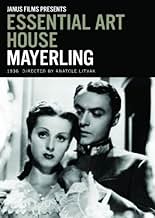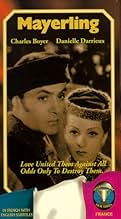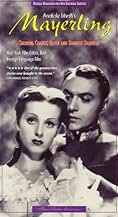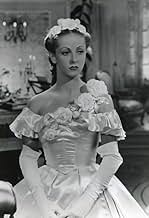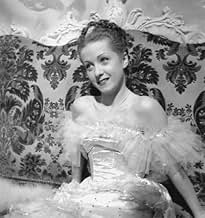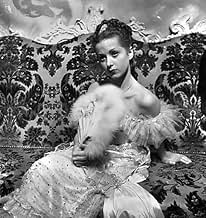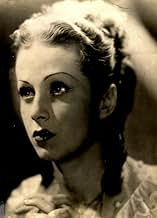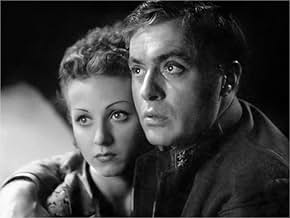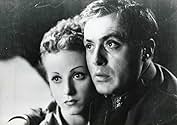Rodolfe, Crown Prince of Austria, is fettered on all sides. He's bored; his father, the emperor, is domineering; his politics are more liberal than his father's, but he knows his views carry... Read allRodolfe, Crown Prince of Austria, is fettered on all sides. He's bored; his father, the emperor, is domineering; his politics are more liberal than his father's, but he knows his views carry no weight. He agrees to marry a princess to sire an heir, then spends his nights as a pla... Read allRodolfe, Crown Prince of Austria, is fettered on all sides. He's bored; his father, the emperor, is domineering; his politics are more liberal than his father's, but he knows his views carry no weight. He agrees to marry a princess to sire an heir, then spends his nights as a playboy. In 1888, he meets Marie Vetsera, 17, a baroness' daughter. She is resolute, smitten,... Read all
- Awards
- 3 wins & 1 nomination total
- La baronne Vetsera
- (as Marthe Regnier)
- La cousine de Marie
- (as Assia)
- Une fille
- (as Ribès)
- Szeps
- (as Bergeron)
- Le chef de la police
- (as Sokoloff)
- Le premier policier
- (as Aimos)
- Le second policier
- (as Siméon)
Featured reviews
So, the advantages: 1. Scenario - if we do not take into account historical inaccuracies and various omissions (which will be discussed later), then we are faced with a tragic love story of the Archduke (heir to the throne) The Austro-Hungarian Empire of Rudolf and his young lover (actually mistress) Baroness Maria Vechera, who committed suicide on January 30, 1889 in the hunting castle of Mayerling (which is near Vienna). Rudolf is married, but unhappy in his marriage, and only acquaintance with seventeen-year-old Maria gave him hope for a better life. After all, the prince is also a liberal, and directly undermines the authority of his father in the state by supporting revolutionary-minded subjects. Moreover, this picture does not consider the political version of suicide, because everything is put in such a way that it is the romantic version that is correct. Indeed, it is the most common and the most studied. And the script itself is built in such a way that the viewer becomes completely on the side of Rudolf and Maria, who were simply driven into a trap - and they decided to get out of it in an unconventional way. Kurt Cobain would have approved of such a passage. In an hour and a half we were shown the life of Rudolf and how he came to such a decision, as well as the life of young Maria, who followed her beloved in the best traditions of romantic literature and the great tragedy of William Shakespeare. It was interesting to watch. After all, the dialogues do not seem pretentious, and the acting is at a high level.
2. Romance - the line between Rudolf and Maria is very good. A young beauty and a married crown prince, unhappy in marriage, therefore often carouses, drowning out the pain with alcohol and easily accessible women, until she accidentally meets Maria - such a pure and innocent soul who fell in love with him at first sight, and after all, his title is not important to her. How naive and beautiful it looks. Now such a thing is almost impossible to meet. A pity. I would like to quote Hippolytus from the famous New Year's tragicomedy by Eldar Ryazanov. There is that "spark" between Rudolf and Maria, which cannot be confused with anything. How they look at each other! This is love!
3. Atmosphere - the creators managed (in general) to recreate the atmosphere of the Austro-Hungarian Empire of the late eighties of the nineteenth century, with its revolutionary movement (mainly Hungarians and Bohemians), turbulent foreign policy situation, problems in the imperial family. And although we are focused only on the latter, revolutionary sentiments are still reflected at the very beginning of the picture (although the very first appearance of the Crown Prince raises questions). Banners, standards - everything is very reminiscent of the now-defunct empire.
So, the cons: 1. Historical inaccuracies - soldiers of the Austro-Hungarian army wear the famous "pikelhelms". Although similar helmets were worn in the Prussian - later German army, and also in the Life Guards of the Imperial Russian Army's Jaeger Regiment in the late forties of the nineteenth century, but the Austro-Hungarian wax did not have such helmets. There is practically no mention of strict morals and etiquette obligatory for the entire aristocracy here (and I'm not talking about the deliberately demonstrative behavior of Rudolf and Maria - everything is clear here). I'm sorry, but in those days this was very strictly monitored, and it was drummed into all the young aristocrats from childhood, so it's simply impossible to look at the promiscuity that is shown here. And these are only the most striking inaccuracies. I'm sure there are others.
2. Omission of important details - in reality, Crown Prince Rudolf, two years before the shots in Mayerling, wanted to pull off a similar trick with his long-term mistress Mizzi Kaspar, but the girl refused. And before leaving for Mayerling, Rudolf spent the last night with this very Mizzi. Moreover, the police ignored the suicide attempt of 1887. Rudolf himself was ill with venereal diseases (syphilis, gonorrhea), and in general he had poor health (whereas Shawl Boyer is the performer of the main role, and is bursting with health). Now you feel how the romance began to fade, and the attempt to self-heal in the company of an old acquaintance in 1887 was not so strange. I'm not talking about other versions of the tragedy (for example, politics).
A little about the main characters: 1. Archduke Rudolf, played by Charles Boyer, is the heir to the throne of the Austro-Hungarian Empire, who is constantly being watched, and who is unable to do anything without the permission of his august father. The only thing he is allowed is to carouse and have affairs with women, since his marriage was a purely political move (which was commonplace for all royal families, starting from the emergence of the first monarchies). And only a meeting with young Maria makes Rudolf go against the system and try to change it. Charles Boyer coped with the role perfectly. Although his image differs from the real Rudolf, he is shown very vividly in the picture. Bravo!
2. Baroness Maria of the Evening performed by Danielle Darye is a young baroness who is only seventeen years old. She could not even imagine that the courteous man in uniform who saved her from an annoying gentleman was Crown Prince Rudolf himself, and that a real love would break out between them, which, although it would end tragically, would leave a bright mark in history. Nineteen-year-old Mademoiselle Darie here amazes with her beauty, although she does not look much like the real Maria, nevertheless she was able to show on the screen the true love of a young girl for the unfortunate prince. Bravo!
This picture is the first film adaptation of the tragic love story of Crown Prince Rudolf and Maria. There are four more film adaptations (not counting theatrical productions, ballets, musicals, and so on), and they all tell exactly about the romantic version of the tragedy, and only the 1949 film adaptation (by the way, also French) also considers others. If you're interested, you can take a look.
My rating is 7 out of 10 and my recommendation for viewing!
"Mayerling" became the first international hit with sound in cinema (with a couple of British pictures the exception). The film's popularity made French actor Charles Boyer a major world-wide movie star, and a barrage of offers from Hollywood studios for Anatole Litvak cascaded on its director. One reviewer labeled the film as "one of the most compelling love stories the cinema has produced," and the co-founder of the American Ballet, Lincoln Kirstein wrote it is "a kind of standard for the romantic film in an historical setting." The movie's title derives from the small town in Austria where Rudolf, the Crown Prince of Austria (Boyer), shot and killed his 17-year-old mistress, baroness Mary Vetsera (Danielle Darrieux) at his hunting lodge in January 1889. Rudolf was the only son to Emperor Franz Joseph of Austria and had been in an unhappy marriage to a princess from Belgium before meeting Mary. Compounding the royal couple's stress was Rudolf had transmitted the clap to his wife as a result of his many affairs.
Actress Darrieux, as Mary Vetsera, was almost the same age of the real-life teenager who was shot by the prince before he took his own life. Her four-year film career to this point resulted in only small parts, but "Mayerling" brought her international fame. Receiving a number of offers from Hollywood, Darrieux and Litvak traveled together to explore their opportunities in Tinseltown. Whereas the film director remained in California where he excelled in directing several highly-regarded films, Darrieux was in only one Universal Pictures film, 1938 'The Rage of Paris,' before returning to Europe. Darrieux eventually became one of France's most popular movie actresses with a career spanning eight decades, lasting until 2010.
Boyer, who had earlier spent a short time in Hollywood, returned to California to enjoy a very rewarding life in films. The book the film's plot was based on, Claude Anet's 'Idyll's End,' served as the basis for Litvak revisiting the tragic tale in his 1957 'Mayerling' with Mel Ferrer and Audrey Hepburn. MGM pounced on the bandwagon in 1968 in its version of "Mayerling" with Omar Sharif, Catherine Deneuve, James Mason and Ava Gardner.
It's ironic Boyer played a character who kills himself over a woman. The actor met and married British actress Pat Paterson just before making "Mayerling," a marriage that lasted 44 years. He was so distraught over her death in August 1978, that he took his own life with an overdose of Seconal two days after she passed away. As for the real Crown Prince Rudolf, his death left his father, Franz Joseph, to seek an alternative when he had no other sons to give the title. The emperor's heir apparent to the Austria-Hungry throne turned out to be his nephew, Archduke Franz Ferdinand, who, in 1914 was shot and killed in Sarajevo, setting off World War One.
Anatole Litvak does not pass over in silence Rudolph's dissoluteness, as two orgy scenes testify.Besides,Charles Boyer is a much better archduke than Omar Shariff.Ditto Danielle Darrieux who was about 20 (whereas Catherine Deneuve was nearing 25 when she played Mary),thus a more credible baroness Vetsera .Both versions,it's important to notice ,are from Claude Anet's NOVEL.It's not a historian's work and it should be not looked upon so.
However,Litvak is a better director than Terence Young.With a much smaller budget,and of course without the 1968 technical aids ,he works wonders :the tiny church where Rudolph meets Mary in half-light creates a mystical and heathen atmosphere at once.The night at the opera house is dazzling.To conclude the scene of the ball at the German embassy ,the artist uses a stunning tracking out which leaves the swirling twirling dancers,then stops on a glass door adorned with the Habsburg emblem.Rudolphe ,firing at his reflection in a mirror is an adequate metaphor.
A minor flaw:Gabrielle Dorziat is completely miscast as Sissi ,Rudolph's mother:she was one of the most beautiful women of her time (we can see the magnificent Winterhalter portraits at the beginning of the movie).At fifty,when the Mayerling tragedy occurred,her beauty was still incomparable.She had nothing to do with the aging dowager we see on the screen (in Young 's version,it's Ava Gardner!)
And hats off to Danielle Darrieux who ,sixty-four years after "Mayerling" ,recently triumphed in "8 femmes",a blockbuster in France.Any advance?
The story unfolds to the inevitable conclusion of murder/suicide which threw the Empire into turmoil. History may record the events of what happened at Mayerling a little differently but it surely makes a good story of thwarted love and royal politics. The 1968 remake with Omar Shariff and Catherine Deneuve is not bad either. This legendary romance has fascinated people since the turn of the century. So have the Kleenex handy and enjoy!!
Recently, I was able to obtain a copy of the this movie and saw it again after 20 years. The movie did not disappoint and I can say that it is one of the best movies ever. It must have been such a sensation when first released in 1936.
Did you know
- TriviaOne of the first foreign films with sound to become a hit in the United States. It made an international star out of Charles Boyer.
- ConnectionsFeatured in Scissors (1991)
Details
Box office
- Gross US & Canada
- $240,000
- Runtime1 hour 36 minutes
- Color
- Aspect ratio
- 1.33 : 1
Contribute to this page


